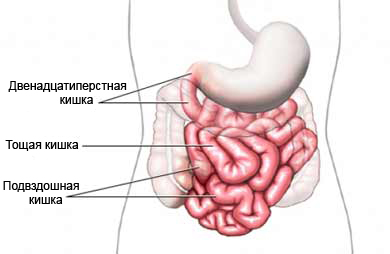Overgrowth of bacteria in the small intestine – Syndrome of excess bacteria
Description excessive bacterial growth in the small intestine
Syndrome of excess bacteria occurs when increasing the number of bacteria in the small intestine.

Causes of excessive bacterial growth in fine gut
Overgrowth of bacteria is often caused by abnormalities in the small intestine, especially when food is not able to properly go through the intestines. Conditions, that could cause this include:
- Birth defect;
- Trauma;
- Operation;
- Disease (eg, digestive disorders).
Risk factors
Factors, that increase the likelihood of excess syndrome of bacteria:
- Crohn's Disease;
- Irritable Bowel Syndrome (CPK);
- Short bowel syndrome;
- Diverticulitis;
- Intestinal stricture (narrowing in the small intestine);
- Digestive disorders (eg, celiac disease, Lactose Intolerance);
- Blind syndrome intestinal loops (When part of the intestine is bypassed);
- Intestinal infections (eg, food poisoning, diarrhea with tourists);
- Cirrhosis of the liver;
- Diabetes;
- Chronic pancreatitis;
- End-stage kidney disease or liver disease.
Other risk factors include:
- Operations on intestines (eg, delete part of the small intestine);
- Obstacles in the small intestine;
- Weakened immune system;
- Advanced age (more likely to have the disease, such as diverticulitis).
Any disease, that affects the, as food moves through the small intestine may increase the risk of the syndrome of excess bacteria.
Symptoms of excessive bacterial growth in the small intestine
Not all patients with excessive growth of bacteria have symptoms. But, if any, symptoms may include:
- Abdominal pain;
- Bloating and gas;
- Feeling of fullness;
- Constipation or diarrhea;
- Nutritional deficiencies (eg, vitamins B12, A, D, IS, gland, tiamina);
- Weight loss.
Diagnosis of excessive bacterial growth in the small intestine
Syndrome of excess bacteria can be difficult to diagnose. Symptoms can be similar to other diseases. Your doctor may do the following:
- Ask about your symptoms and medical history;
- Conduct a medical examination;
- Order the following tests:
- Blood tests for the detection of nutritional deficiency (eg, anemia, vitamin B12 deficiency);
- Respiratory samples – includes taking some kinds of food (mostly sugars), and then exhale into a special bag; samples are analysed at the level of some gases;
- Culture of intestinal fluid (Aspiration) – to obtain a sample of fluid from the small bowel catheter is used.
Treatment of excessive bacterial growth in the small intestine
The goals of treatment:
- Reduce the level of harmful bacteria in the small intestine;
Treat the underlying disease.
Medication
Often for the treatment are appointed by antibiotics. Usually the treatment is temporary. But in some cases, You may need to take antibiotics for a prolonged period.
Special nutrition and diet
To make sure, that the body gets all the necessary nutrients, you may need:
- Working with a dietitian;
- The maintenance of special diets (eg, low carbohydrate diets);
- Intake additives (eg, gland, B12);
- Intake of probiotics.
In some cases, feeding should be carried out using a special tube.
Operation
For severe cases, surgery may be needed. It is performed to correct anomalies in the small intestine.
Prevention of excessive bacterial growth in the small intestine
If a person has any disease, that can lead to excessive increase of bacteria in the small intestine, need to get proper treatment. It can reduce the chance of bacteria in the small intestine.
